
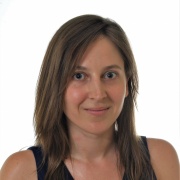
18.00
Júlia Miralles de Imperial Pujol
Delegada de Ciència i Universitats de l’Ajuntament de Barcelona.
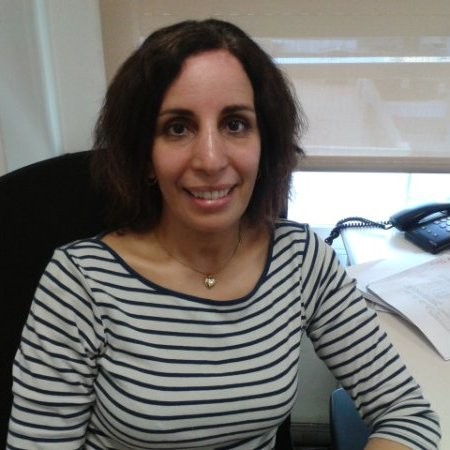
18.05
Fatiha Nejjari Akhi-Elarab
Vicerectora de Docència i Estudiantat Universitat Politèncica de Catalunya - Barcelona Tech (UPC).
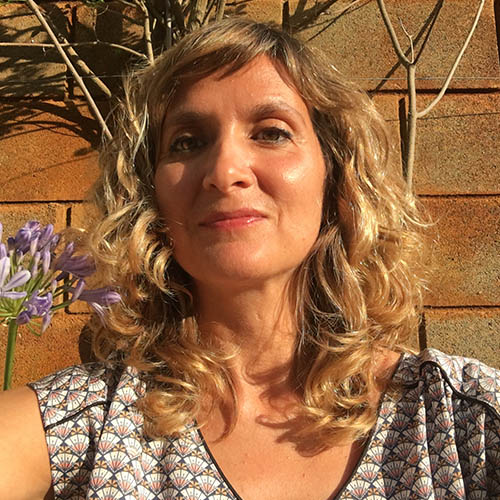
18.10
Elisabet Aznar Vacas
Directora del CESIRE, Departament d’Educació de la Generalitat de Catalunya.
Mariona A. Ciller, co-founder and director of SokoTech and STEAMConf, Barcelona
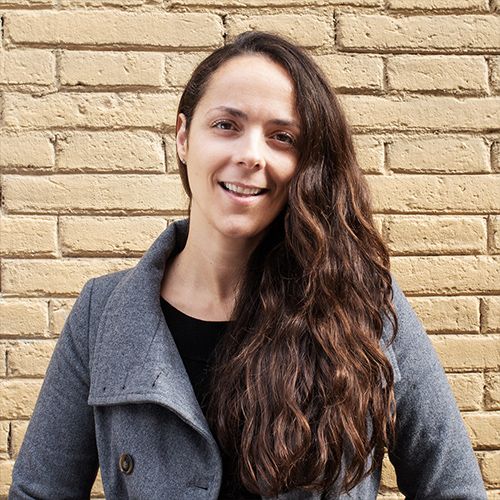
Graduated cum laude from the University of Illinois with a double major in Fine Arts (B.F.A.) in Visual Communication and Art History disciplines. Master of Science (M.Sc), Mass Media & Management Studies, and Assistant Professor at the same university teaching classes on free software tools and open culture. Her thesis Free Culture Project, which fuses the potential of technology with the transforming power of education, is a turning point in her career towards territories of reinvention of the world of teaching and learning hand in hand with emerging technologies. Postgraduate in Design Research & Management Educational Evaluation and Research from the Higher Institute of Education and Sciences of Lisbon (ISEC), she has a diploma from the Fab Academy (Fab Foundation - MIT) and currently is a PhD student in Computer Sciences & Human Computer Interaction at Pompeu Fabra University (UPF). In 2015, she co-founded SokoTech, a digital social innovation laboratory, bringing together an intersectoral team of experts in the conception and production of projects on the arts, science, and technology frontier.
Nancy Otero, Director of Learning at Make/ Founder and CEO Kitco, San Francisco, CA, USA
Local Peer: Mariona A. Ciller, co-founder and director of SokoTech and STEAMConf, Barcelona
What would it be like if a school turns its entire curriculum into projects, Nancy Otero wondered, without conventional classrooms and without isolating disciplines? No schedules or grades? At Portfolio School in New York, tests, grades and schedules were eliminated, creating a learning framework where DOING transformative projects became a fundamental piece to apply and internalize powerful human ideas. Four years later, says Nancy, DOING is a fundamental avenue of learning, a tool that tangibly shapes a legacy of human ideas while adding personal meaning. This way of learning is not only for schools but for universities, for adults and informal learning.
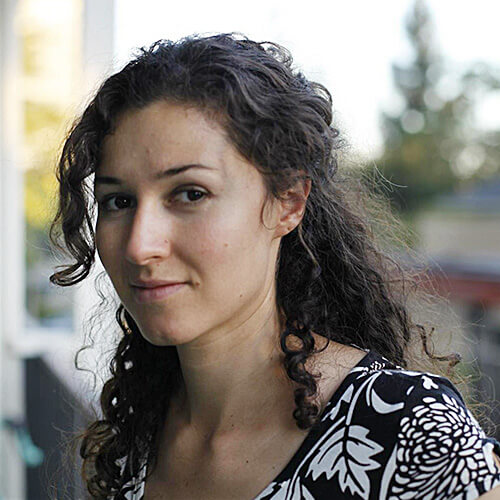
Nancy’s biggest passion is human learning, she has spent the last fifteen years working with educational organizations designing environments that mix technology with project-based learning. Nancy was the Founding Director of Learning Design at Portfolio School, a project-based learning school in NYC. Students from this program are the youngest presenters -6, 8, and 9 years old- at Stanford’s conference FabLearn. She was the Director of Professional Development at the Beam Center in NYC, where she created a program that served more than one hundred teachers and thousands of students. She co-founded FAB!, a non-profit in Mexico that works with underserved communities for 5 years. Nancy was a OpenAI fellow, and a software engineer in her previous life. She has a Master in Learning, Design and Technology from Stanford University.

Graduated cum laude from the University of Illinois with a double major in Fine Arts (B.F.A.) in Visual Communication and Art History disciplines. Master of Science (M.Sc), Mass Media & Management Studies, and Assistant Professor at the same university teaching classes on free software tools and open culture. Her thesis Free Culture Project, which fuses the potential of technology with the transforming power of education, is a turning point in her career towards territories of reinvention of the world of teaching and learning hand in hand with emerging technologies. Postgraduate in Design Research & Management Educational Evaluation and Research from the Higher Institute of Education and Sciences of Lisbon (ISEC), she has a diploma from the Fab Academy (Fab Foundation - MIT) and currently is a PhD student in Computer Sciences & Human Computer Interaction at Pompeu Fabra University (UPF). In 2015, she co-founded SokoTech, a digital social innovation laboratory, bringing together an intersectoral team of experts in the conception and production of projects on the arts, science, and technology frontier.
Curt Gabrielson, Director, Salinas Community Science Workshop, San Francisco, CA, USA
Local Peer: Oriol Codina, IT engineer, social educator and a permaculture enthusiast, director of Education at SokoTech, Barcelona
We Put Tools in Kids’ Hands. For the past 30 years Community Science Workshops have offered free spaces where kids from underserved communities can go to explore the world through science and create the projects of their imaginations. Curt has been involved in several of these spaces and believes every kid should have access to a workshop.
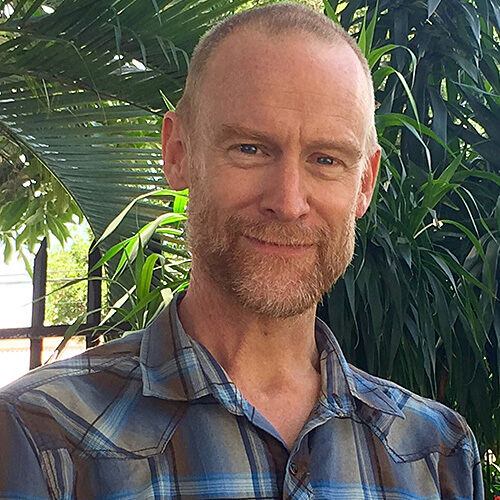
After learning the most useful things in life growing up on a hog farm, Curt learned physics at Massachusetts Institute of Technology (MIT) and education at the Exploratorium Teacher Institute. He taught science from junk in China, Timor-Leste, India and California. He worked at Mission Science Workshop for 2 years, started and ran the Watsonville CSW for 11, and worked beside José Sánchez at the Greenfield CSW for 2.
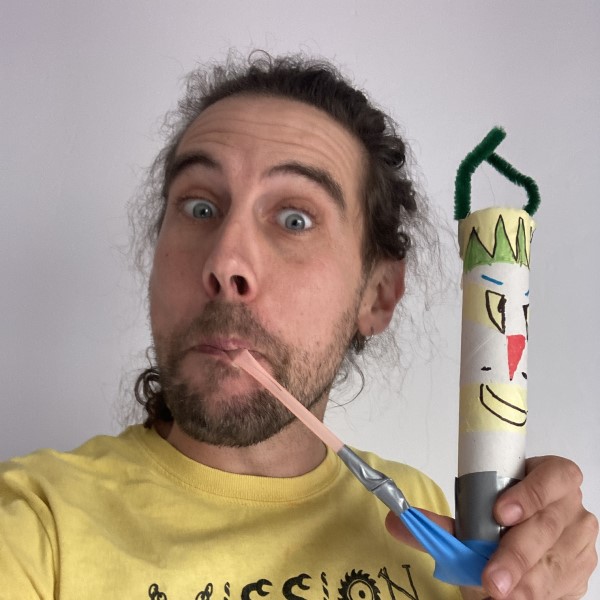
IT engineer, social educator and a permaculture enthusiast. He has more than 4 years of experience in creating and providing science programs for underserved communities in San Francisco, CA. As a Director of Education at SokoTech, he is currently teaching and developing Tinkering programs to teachers from high-need schools in Barcelona. His mission is to give a voice to vulnerable groups and empower them through education and leadership programs. He also advocates for creating healthy places in our communities.
Rosemarie T. Truglio, Senior Vice President of Curriculum and Content at Sesame Workshop, New York, NY, USA
Local Peer: Mariona Ciller, co-founder and creative director of SokoTech, Director of STEAMConf, Barcelona
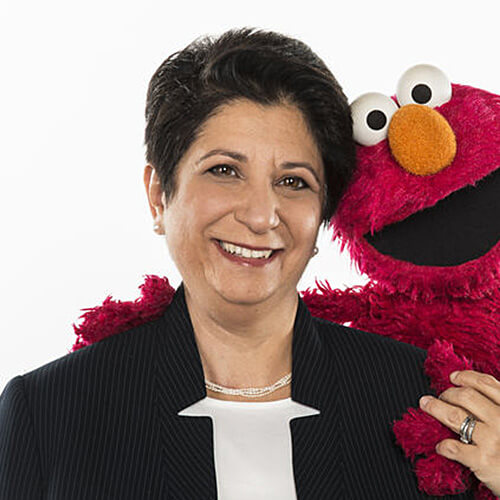
Rosemarie T. Truglio is responsible for the development of the interdisciplinary curriculum on which Sesame Street is based and oversees content development across platforms (e.g., television, publishing, toys, home video, and theme park activities). She also oversees the curriculum development for all new show production, including Esme & Roy, airing on HBO. From 1997 to 2013, she oversaw all educational research pertaining to program development, the results of which informed both the production and creative decisions for how to enhance the entertaining and educational components of linear and interactive content. Before joining Sesame Workshop in 1997, she was an Assistant Professor of Communication and Education at Teachers College, Columbia University. Dr. Truglio has written numerous articles in child and developmental psychology journals and presented her work at national and international conferences. Her current book is Ready for School! A Parent’s Guide to Playful Learning for Children Ages 2 to 5, published by Running Press (2019). Additionally, she is co-editor of “G is for Growing: Thirty Years of Research on Children and Sesame Street” (2001), published by Lawrence Erlbaum Associates. Dr. Truglio currently serves on several advisory boards: NSF: Child Trends News Service and Read Alliance Advisory Council. She previously served on the National Advisory Child Health and Human Development Council (NICHD); Lego Foundation Research & Innovation Network; NSF REESE grant entitled Collaborative Research: Using Educational DVDs to Enhance Preschooler’s STEM Education; PBS KIDS Next Generation Media; Learning Through Play Children’s Museum of Manhattan: All the Way to K and Beyond!; the Children’s Digital Media Center Advisory Board; the National Association for Media Literacy Education; PlayAbility Scale Board/Parent’s Choice Foundation; and The Ultimate Block Party/Learn Now. Dr. Truglio received a Ph.D. in Developmental and Child Psychology from the University of Kansas, and a B.A in Psychology from Douglass College, Rutgers University. She received distinguished alumni awards from Douglass College (2005), University of Kansas (2013), Rutgers University (2014), and the University of Kansas Women’s Hall of Fame (2015).

Graduated cum laude from the University of Illinois with a double major in Fine Arts (B.F.A.) in Visual Communication and Art History disciplines. Master of Science (M.Sc), Mass Media & Management Studies, and Assistant Professor at the same university teaching classes on free software tools and open culture. Her thesis Free Culture Project, which fuses the potential of technology with the transforming power of education, is a turning point in her career towards territories of reinvention of the world of teaching and learning hand in hand with emerging technologies. Postgraduate in Design Research & Management Educational Evaluation and Research from the Higher Institute of Education and Sciences of Lisbon (ISEC), she has a diploma from the Fab Academy (Fab Foundation - MIT) and currently is a PhD student in Computer Sciences & Human Computer Interaction at Pompeu Fabra University (UPF). In 2015, she co-founded SokoTech, a digital social innovation laboratory, bringing together an intersectoral team of experts in the conception and production of projects on the arts, science, and technology frontier.
Five minutes to discover how girls, boys, teachers and Abacus create together Alexandria an underwater city committed with the sustainable development goals (SDGs), and discover how Abacus Cooperativa can help you in your educational robotics classroom!

Júlia Oliveros, student, (8 years old), Víctor Villar, student (11 years old), Rosa Pastor, Teacher of the Tecnos school,Terrassa, Robert Salas, Head of learning Technology of Abacus Cooperative.
Luigi Anzivino, Professional Development Lead for the Exploratorium’s San Francisco Tinkering Studio, CA, USA
Local Peer: Sandra Romero López, member of the Magnet Project and of the management team of the Montessori School of Rubí (Barcelona)
Tinkering is a hands-on learning process and a way to develop understanding about the world. It engages learners directly with real phenomena within an intentional exploration space, with activities designed to promote purposeful play, to honor learners choice when it comes to their ideas, goals, and approaches, and to foster collaboration between learners, and with educators. Tinkering experiences empower both educators and learners. Through tinkering learners develop an understanding of science processes and ideas. They also develop understanding about their own potential as learners. Tinkering promotes agency, the confidence to make choices and think independently, and it inspires joy and enthusiasm for learning.
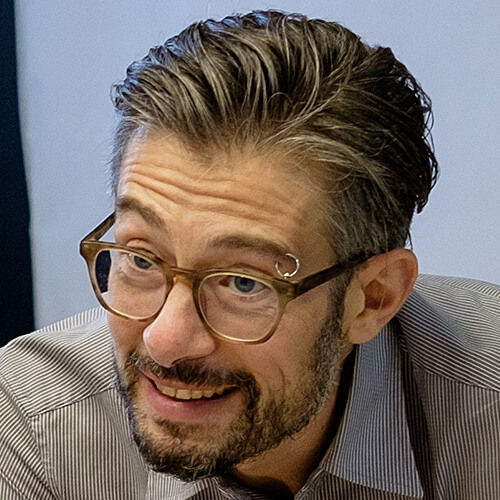
He is the Professional Development Lead for the Exploratorium’s Tinkering Studio. Also a former neuroscientist, a magician, and a survivor of academia. He focuses on developing, documenting, and sharing with others in the field rich learning experiences, with the goal of creating a physical, cultural, and social space that is safe for trying out tentative ideas, not knowing the right answer, and developing the skill of posing—even more than solving—interesting problems.
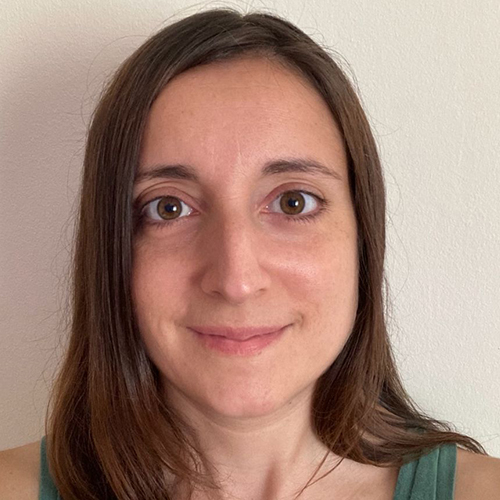
She has a degree in English / French-Spanish Translation and Interpretation from the Autonomous University of Barcelona (UAB) and is a specialist teacher in Foreign Language from the University of Barcelona (UB). She holds a Teaching Certificate. She has specialized in language learning using globalized methodologies. Convinced of the importance of transversality in education, she works to implement and promote STEAM vocations in educational center workshops. She is part of the management team of the Montessori School of Rubí and member of the Magnet Project, projecting Tinkering in the day to day of schools.
To exercise the mind, heart and hands with simple resources, explore and practice STEAM experiences!
To exercise the mind, heart and hands with simple resources, explore and practice STEAM experiences!
Jie Qi co-founder and CEO of Chibitronics, Florida, FL, USA; Natalie Freed, Education Team Member of Chibitronics, Austin, TX, USA.
Local Peer: Khadija El Aadmi Laamech, Research Group of Interactive and Distributed Technologies for Education (TIDE- UPF), Barcelona.
Paper Circuitry is a fun and friendly medium that blends the art of papercraft with the interactive power of circuits and code. Using everyday and inexpensive materials, you can create projects that shine and glow, dance and sing. Join us for a journey from early paper circuits to amazing artworks from artists and engineers. We will also share fun activities and inspiring student projects from classrooms around the world. Finally, join us for a small hands-on demonstration of the magic that happens when we blend art with technology to share our stories and express ourselves!
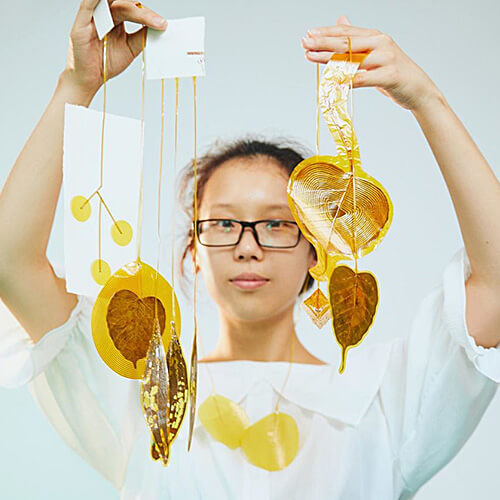
Co-founded in 2014 Chibitronics, a company that produces creative learning toolkits. Her mission is to combine art with engineering to empower creators of all backgrounds to make their own expressive and personally meaningful technologies. A 2017 fellow of the Berkman Klein Center for Internet and Society at the Harvard University Law school, Jie created PatentPandas.org, a resource to teach patent law through friendly panda comics, share real life inventors’ stories and connect independent creators to free legal counsel. Jie holds a B.S. in mechanical engineering from Columbia University and an M.S. and Ph.D. in media arts and sciences from the MIT Media Lab, where she was a member of the Responsive Environments, High-Low Tech and Lifelong Kindergarten groups. Jie has exhibited internationally, including at the Museum of Modern Art, Exploratorium Museum, Ars Electronica, Boston Museum of Fine Arts, MIT Museum, and Shenzhen Design Society. Her work has been featured on WIRED, Fast Company, Huffington Post, Scientific American, The Atlantic, the Financial Times and the New York Times. She has given invited talks and workshops across diverse venues including MIT, Harvard, Rhode Island School of Design, NYU, LEGO, Google, Microsoft, and the White House Office of Science and Technology Policy.
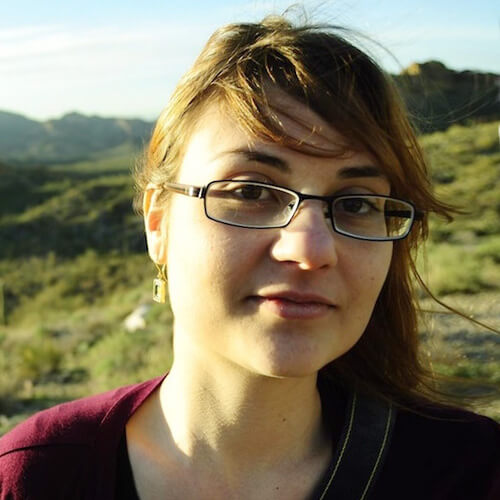
A STEAM Education doctoral student at the University of Texas, Austin, is part of the Chibitronics Education Team. She holds a B.S. and M.S. in Computer Science from Arizona State University and a M.S. from the MIT Media Lab. She has worked as an exhibit developer, taught high school computer science, and has led workshops on paper circuits, the mathematics of bookbinding, and other intersections of tech and craft.
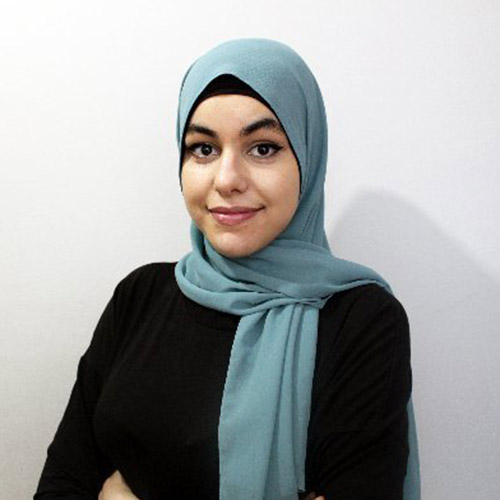
Graduated in graphic and product design and with a master’s degree in user experience (UX) and interaction design, Khadija is currently a doctoral student at UPF’s engineering school in the Information and Communication Technologies department. She has a special interest in technological well-being through UX and the design of interfaces in educational environments, this being the main field of her research and development of her professional activity.
Mariona Ciller, director of STEAMConf, Barcelona.